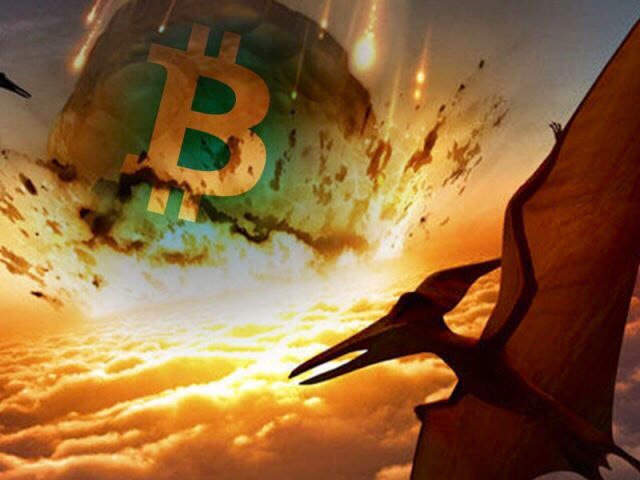
please put like if you want more news
Bitcoin "Meteor"
During a speech before the meetup community in Milan in March 2016, Antonopoulos presented the invention of cryptocurrencies are just in the midst of the crisis in 2008 as an analogue of a global cataclysm. In some ways, like a meteor that strikes the Earth, it can not only burn the most of the now invincible "dinosaurs", but also to create absolutely new conditions for the emergence and development of "new species".
"On 3 January 2009 in the skies over our society, there is a meteor, begins Antonopoulos sarcastic tone, "up To this point, banks were the kings of this planet, as a giant, hulking dinosaurs. They completely dominated for hundreds of millions of years of disregard and disrespectful to the small, harmless mammals on which they from time to time, blithely stepping feet."
At the time, dinosaurs reached a point of "equilibrium", after which the pace of evolution has stopped. By analogy, the modern financial system has reached a point, becoming stagnant, oligopolio system in this, where ordered input to all "new" and participants.
But evolution is not linear. It works on the principle of so-called "punctuated equilibrium," explains Antonopoulos. "Equilibrium lasts a very long time, but then the moment comes strong acceleration of the evolution to the extent that, as many things change and new external conditions".
Such a sharp acceleration is made possible by the events like a meteor, destructive, similar to the "black Swan", they open up new niches where new species can evolve and adapt better than prevailed yesterday.
Bitcoin not compete with the banks
Bitcoin, of course, this is the same meteor that was cut in the current system a new niche. Anyway, Antonopoulos suggests that we should not evaluate this new niche, looking at it through the eyes of a dying dinosaur. Of course, we are still trying to describe and understand Bitcoin with traditional financial terms; we still measure it "evolution" in U.S. dollars. Some even pathetically declare Bitcoin dead, although in fact it is still in its infancy.
But should "new" money at all to compete with traditional financial institutions? Antonopoulos explains:
"In this new niche, we do not compete with banks by using Bitcoin, because Bitcoin has adapted to a different environment. Bitcoin is not money, physical space, money is the Internet. Bitcoin is not money of the state. Is the money in the world. It is not money the current generation. This money is for the generation that is just coming."
In other words, Bitcoin does not need to compete directly for survival with the current financial institutions or attempt to destroy them. Cars and locomotives did not destroy the horses or wagon. Rather, they made the trip in this vehicle a lot less relevant, and more importantly, created new infrastructure, jobs, industry, and sopresetta markets.
Thus, we should reconsider Bitcoin and other emerging currencies in an entirely new light. All this is because this new niche accelerates innovation in the technology of money and beyond. Antonopoulos calls it "an explosion in the monetary environment."
Mainly for this reason, we see Bitcoin take root in such conditions, where the traditional players fail from the beginning. That is why we are witnessing the emergence of Ethereum, DASH and similar cryptocurrencies, as well as hundreds of thousands of projects which simply could not exist before 2009.
"January 3, 2009, there were 194 world currencies. Today there are more than 3000 of the world's currencies, all of which except the above mentioned 194 — a digital, decentralized online money. This is an all new species that live on the Internet. Yes, most of them will die. Most will disappear. But the rest will continue to independently evolve," predicts Andreas.